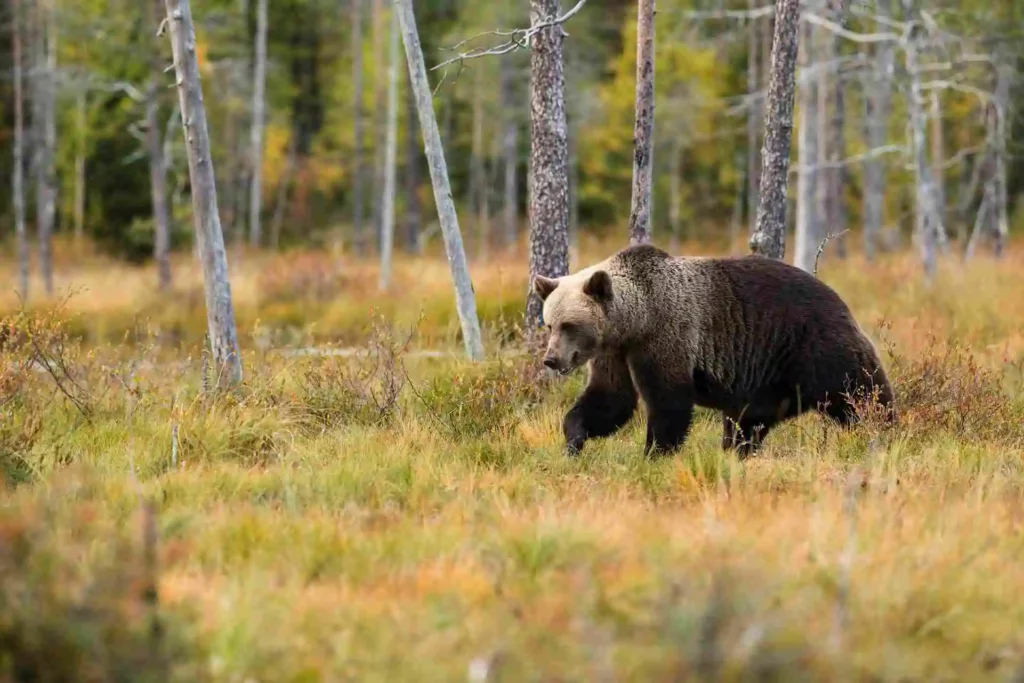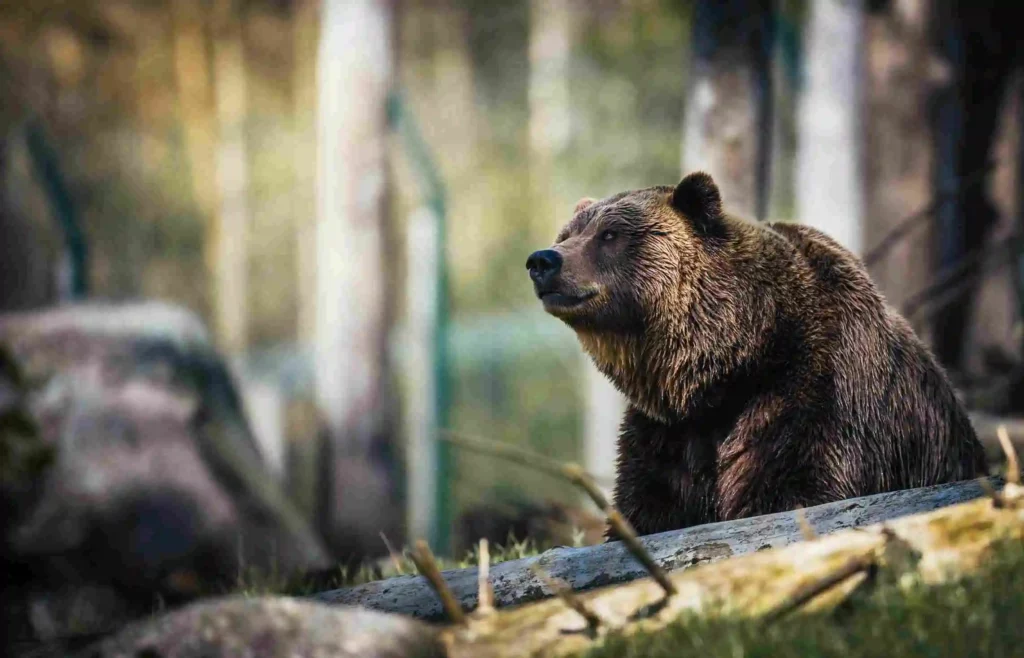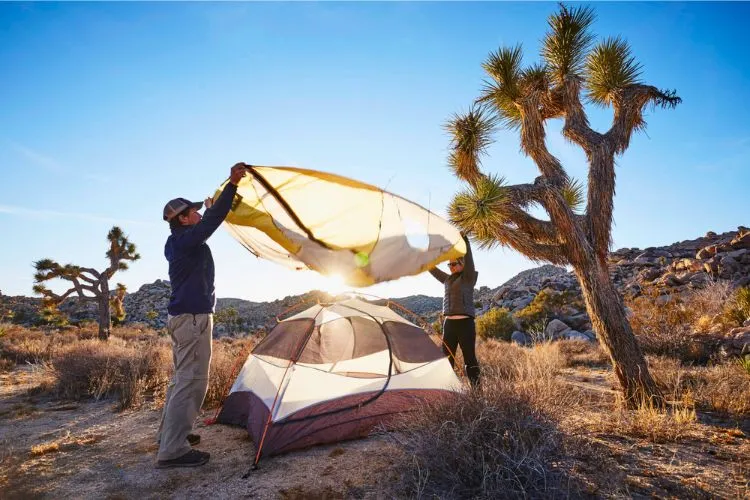As the sun dips below the horizon and the stars begin to twinkle, the quiet rustle of wildlife stirs around the campsite. For many backpackers, hikers, and campers, this moment is a pinnacle of their outdoor adventure.
In recent years, freeze-dried food has become a staple in their packs. But, can bears smell freeze dried food?
This article delves into this concern, offering insights for a safe and enjoyable outdoor experience. It’s a given fact that lightweight, long-lasting, and nutritious, these meals offer convenience in the wilderness.

Can Bears Smell Freeze Dried Food?
The question is not simple. The freeze-drying process does not remove all scents. Bears, with their strong sense of smell, can likely detect freeze-dried foods, especially if not stored properly.
Packaging can help hide these smells, but it’s not foolproof. Stories from hikers support this, noting bear interest in improperly stored meals.
Bears have an incredible sense of smell. They can detect odors far better than humans. This keen sense helps them find food across great distances. Understanding this is key to managing food smells in bear territories.
Minimizing Bear Attraction: Strategies for Safe and Respectful Camping
When venturing into the great outdoors, particularly in areas known to be inhabited by bears, minimizing the attraction of these powerful animals to your campsite is not just a safety measure—it’s a responsibility.
Bears, driven by their acute sense of smell, can be drawn to food from miles away. Here, we delve into detailed strategies to keep bears away, ensuring both your safety and the preservation of natural bear behavior.

Importance of Proper Food Storage
The cornerstone of bear safety is the proper storage of food and scented items. Bear canisters and bags are specifically designed for this purpose. Bear canisters are hard-shelled containers that are difficult for bears to open, while bear bags are made of materials that bears can’t easily tear open.

Both are designed to contain odors that attract bears. When using these containers, it’s crucial to store them a safe distance from your sleeping area—experts recommend at least 100 yards away—to minimize the risk of a bear encounter.
Cooking and Eating Practices
How and where you cook can significantly impact bear attraction. To reduce the risk, cook and eat in an area that’s downwind and as far away from your sleeping area as possible. This strategy helps disperse cooking odors away from where you’ll spend the night.
Use a stove instead of an open fire to cook, as stoves produce less smoke and odor. Keep meals simple to reduce lingering smells, and immediately clean all cooking utensils and surfaces after eating. Double-bagging trash and sealing it in bear-proof containers can also help mask odors.
Selection and Management of Campsites
Choosing the right campsite is vital in bear country. Avoid camping in areas with obvious bear signs, such as tracks, scat, or overturned rocks. If you’re in a designated camping area, use sites that are at a distance from bear activity markers.

In backcountry settings, look for sites that are not along natural bear travel paths, like game trails or berry patches. Elevate your campsite’s safety by being tidy. Ensure all food, trash, and scented items are stored in bear-proof containers overnight and whenever you’re away from the campsite.
Additionally, changing into clean clothes before sleeping can reduce odors that attract bears; store the clothes you cooked in with your secured food items.
Use of Bear-Proof Food Storage Facilities
Many parks and camping areas in bear country provide bear-proof food storage lockers or poles. These facilities are designed to secure food away from bears and should be used whenever available. Make sure to follow the facility’s guidelines for use, ensuring that doors or lids are securely locked after storing your food.
Minimizing bear attraction is essential for a safe camping experience in bear country. By implementing proper food storage techniques, being mindful of cooking and eating practices, selecting campsites wisely, and utilizing bear-proof facilities, campers can significantly reduce the likelihood of bear encounters.
These practices not only protect campers and their belongings but also contribute to the safety and well-being of the bears. By respecting these magnificent animals and their natural habitats, we can enjoy the beauty and thrill of the outdoors while ensuring a harmonious coexistence.
Pro Tips for Handling Freeze-Dried Food in Bear Country
Choosing less smelly freeze-dried foods can make a difference. Using odor-proof bags and containers is a smart move. Cleaning up every food trace after eating is vital. Some campsites offer bear-proof storage. Using these can add an extra layer of safety.
Legal and Environmental Considerations
Many parks have rules about storing food. These laws help keep bears wild and safe. Breaking these rules can change bear behavior. It can make them associate humans with food.
This is dangerous for both bears and people. Following these rules is not only about following the law. It’s about respecting wildlife and nature.
Frequently Asked Questions (FAQs)
How effective are bear canisters at preventing bears from smelling food?
Bear canisters are designed to be tough and scent-proof. They are highly effective at keeping bears away from your food. Yet, no solution is perfect. Bears are curious and might still investigate.
Can bears be attracted to food that has been eaten and repackaged?
Yes, bears can be attracted to these foods. Even small traces of scent can lure them. It’s crucial to manage all food and waste with care.
What should I do if a bear approaches my campsite?
Stay calm. Do not run or approach the bear. Make noise to scare it away. Always keep a safe distance. If you’re prepared and follow safety guidelines, these encounters can end safely.
Are there any freeze-dried foods that are less appealing to bears?
Foods with less odor are less likely to attract bears. Choosing meals with minimal scent can help. Yet, remember that bears have a keen sense of smell. Any food can potentially attract them.
How can I prepare my freeze-dried food to minimize odors while camping?
Cooking and eating away from your sleeping area is a good practice. Using odor-proof bags can also help. Always clean up thoroughly after meals to minimize odors.
Conclusion:
While enjoying the beauty of the wilderness, it’s essential to remember we are visitors in the homes of wild animals. Freeze-dried food, though convenient, requires careful handling to avoid attracting bears.
By following best practices for food storage and cleanliness, we can ensure a safe experience for ourselves and protect the natural behavior of the wildlife around us. The wilderness offers us a unique escape; let’s honor it by respecting its inhabitants and rules.


